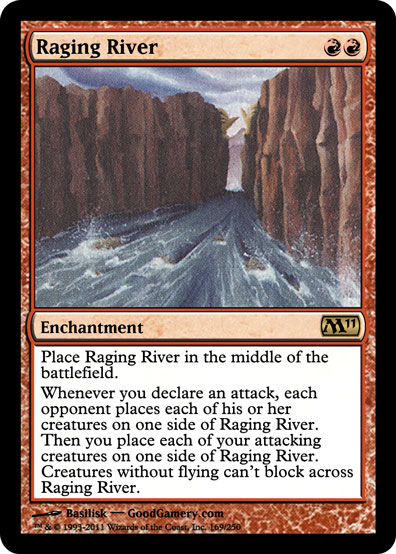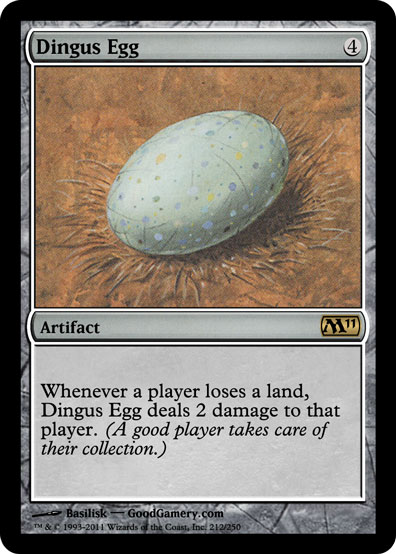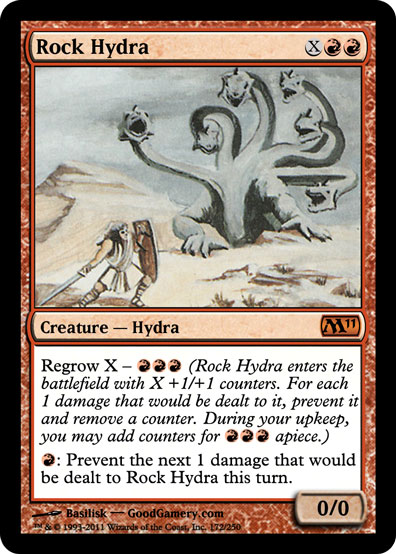One of the most important aspects of the core set is its flavor. The core set is, a lot of the time, the first thing a new magic player sees; We need each and every card to convey the essence of a fantasy card game. Now, flavour often goes hand in hand with simplicity – A Runeclaw Bear’s text box communicates the message that the card represents a magic bear, and all the coolness of this fact, without saying anything mechanically. However, sometimes the opposite is true; The mechanics make the flavour.
Back when Alpha was released, Magic’s primary audience was amongst the Dungeons and Dragons community. This meant we had to present spells in the sense that tabletop gamers were used to them. When they summoned a Hydra, they expected it to regrow a few heads. Since then, Magic has become streamlined and simplified, with its own set of mechanical standards, but the simple appeal of regrowing heads still holds a powerful sway with both new and old contingents of the Magic fanbase. This is the mood we tried to recapture by reprinting Stone Giant in Magic 2010, and the huge success of that card has inspired us to develop the theme further in Magic 2011.
Sometimes, having a rigid, logical system of templating greatly simplifies a card – Fog has vastly improved between Alpha and today. However, in other cases, the need for unambiguity creates more confusion than there would otherwise had been, as evidenced by lengthy and technical text boxes on simple cards like Drudge Skeletons. Our first attempt to break away from this trend was with the Zendikar card Obsidian Fireheart, whose nonstandard reminder text proved universally popular and answered more questions than it raised. Clearly, the power of immediately graspable flavour has been underestimated for too long.
So what does all this actually mean for M11? It means that we are able to print or reprint the kind of fun cards we have always wanted to in the core set but, until now, have been prevented by their overly complicated rules text. If we had told you a year ago that this classic card was returning, would you have believed us?

With a card like Raging River, it’s best to let the players themselves work out the technical details, and not have to cover all possible eventualities in the rules text. It may look daunting, but in our playtesting with Raging River it was always immediately obvious how the board was affected.
Although a card like Raging River doesn’t need reminder text, Obsidian Fireheart has shown us that ‘Alpha-style’ reminder text can be an extremely powerful educational tool for new players. Rather than convey obvious information like ‘damage causes loss of life’, it is best used to tell players things they couldn’t learn by simply asking their opponent. Consider this once-banned Alpha favourite:

As well as allowing us to return the card to its original functionality, Dingus Egg’s reminder text allows us to give an important message to new players: Take care of your cards and they’ll take care of you.
At times, it is not so easy to accommodate the intentions of old cards. There are cases where the original mechanics just don’t fit into the modern rules. However, at the request of ‘evil’ rules manager Mark Gottlieb, we have been able to bend both the comprehensive and tournament rules to allow some very special examples whose return we are all very excited to see. In case you don’t know what we’re talking about, here’s a little peek:

You can find information about the legal requirements and responsibilities of Designated Flipping Assistants on the Tips & Tricks inserts in M11 boosters.
Now, three preview cards is really all we’re supposed to show you until the official preview season starts, but there is one more thing we think you should know about M11. There is one particular example of our new approach to flavour and templating that we are all very proud of. There is one card in M11 that has an aura of excitement about it unmatched by any other. This is that card.

In an unrelated announcement, all DCI judges have resigned.